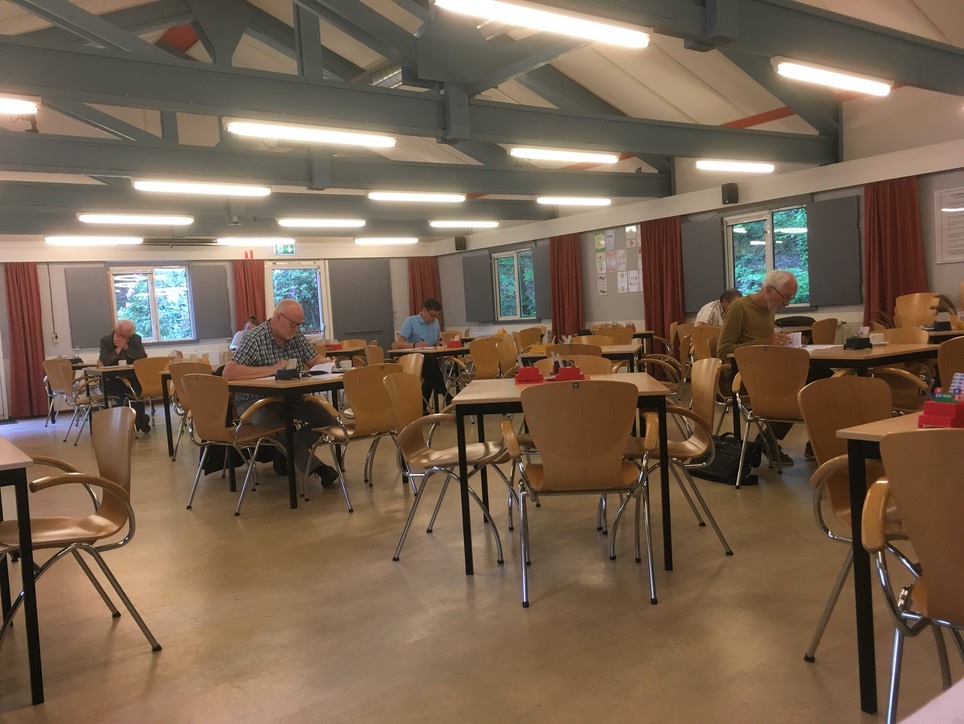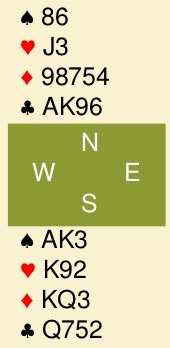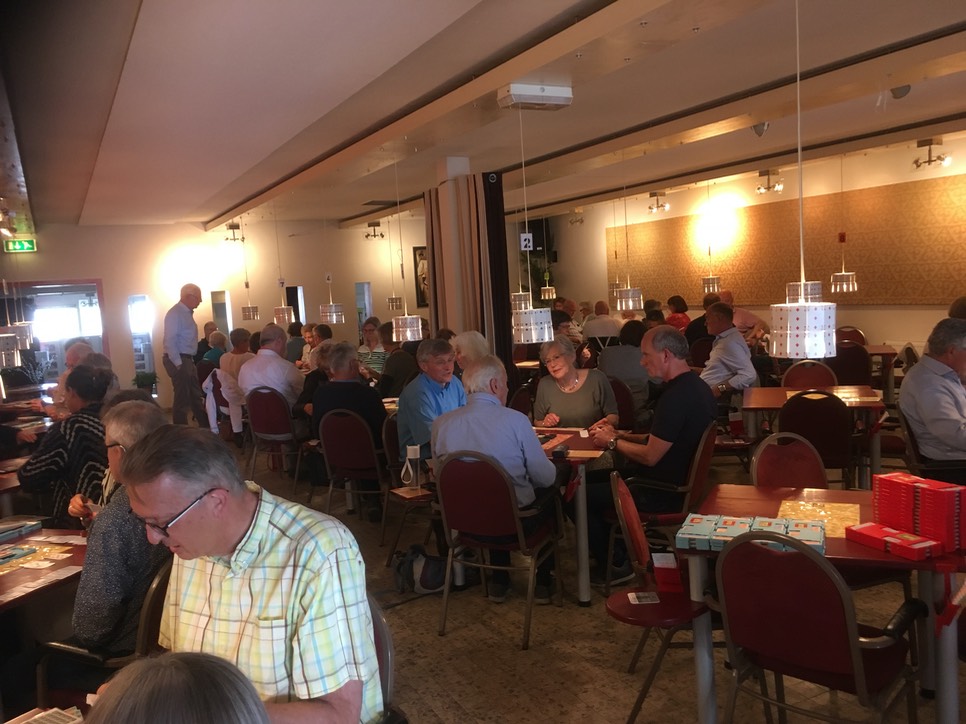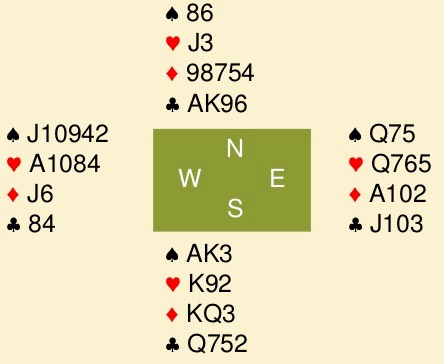Stress causes, amongst other things, that people overlook the easiest and obvious solution to a problem. It happens at the bridge table too, and even directors suffer from it. An example from last Saturday. You are running a pair event, 9 tables, straight Mitchell. 5 minutes into round 1, table 3 calls you. They have just finished board 10 (!) and the Bridgemate refuses to accept the score. That makes sense, as table 3 should have started with board 7 to 9. After a few seconds, you realize that you have accidentally put boards 7 to 9 on table 4, and 10 to 12 on table 3. Table 4 is somewhere around trick 5 of board 7. Now what?
There is a really simple solution and that is to swap the table numbers (or pair numbers) of the 4 pairs involved. Whoever played board 7, becomes pair 3NS/EW, whoever played board 10 becomes pair 4NS/EW. All you have to do is adjust the names of the players in the computer. Done.

The Junior TD Exam
This was question 1 of the written TD exam last weekend. Obviously, the candidates are quite nervous at this point. Even if they prepared well, they are nervous, a bit old and often haven’t taken a written test for ages. And what happens? They open the law book (as intstructed), find law 15 and come up with all kinds of solutions involving reshuffling, adjusted scores, penalties, and what not. One candidate went as far as redefining the board sets in the computer to 7-11-12 and 10-8-9 (which is possible and correct, but takes forever). Much to my surprise, only one candidate came up with the solution above. Part 2 was to name potential problems of the chosen solution and he came up with an honest “There aren’t any”. Unfortunately, I couldn’t give him a bonus point for that.
For completeness. The standard solution didn’t (at first) mention this possibility, showing that the exam committee overlooked the obvious as well. Thery have corrected this since.
Speaking about nervous players. I had 80 of them in the room last Sunday. And that was for a good reason. It was their first district game ever.  That might explain some of the results on this board, where you are in 3NT after a simple 1NT-2NT-3NT. on a ♠J lead. More about that board later
That might explain some of the results on this board, where you are in 3NT after a simple 1NT-2NT-3NT. on a ♠J lead. More about that board later
Once a year, the district hosts a special game for all new players in the district. New players are players who started to learn the game less than 2 years ago, and to make the field more level, the players are split up into two groups: A for those who started after September 1, 2018, and B for those who started a year earlier.
It is not easy to find those players, as they are usually not yet a member of the federation (yet). Instead, as a district we contact all known teachers personnaly a month or 2 before the game, provide them with a flyers and ask them to encourage their students to attend. That works, over the years we average about 40 pairs. Of course, if a player registers for the A-group, we keep his email address and contact him directly for the B-group the next year. European Data Protection Act or No EPDA :)
For the teachers, the point is that they stress to their students that they will be playing in a new environment, against people that they have never seen before but that this applies to everybody in the room. That said, the whole game is tuned towards new players:
- A relaxed schedule: start at 11am, play 9 boards at a pace of 10 minutes a board, break for lunch, play 12 more boards. 21 boards on a day is more than that most people have played on a single day before.
- Prepare the hands, shuffle but then select hands that people can bid with the knowledge they have after 1 or 2 years. After the game, we provide hand records with a short explanation how we think the hand should be bid and played.
- Coffee and thea before the game, a good lunch (soup and sandwiches), and drinks after the game.
- All cribsheets and other aids are allowed. 2 teachers are walking around the room to help with all problems that might occur. The players should play the hands themselves though.
- Offer small prizes (books, calendars, etc), people like to win something.
- Finally, keep the costs for the players low. The district (and federation) do subsidize the event, and we could keep the entry fee to €7.50 a player. Money shouldn’t be an obstacle for the players. I haven’t done the exact calculation, but a quick estimate is that this is about 1/3 of the actual costs.
As a TD, this is probably the most fun event that I run every year. You have to be there early, when I showed up about an hour before, players were already waiting in front of the building, even though we said that the doors wouldn’t open before 10:30. And then there is this long line of nervous new players all dying to register. Nobody dares to be late, so at 10:46 all registered players were there. I just wish that they’d keep that up.

The game in process
10 minutes a board is sufficient, though it is good to keep an eye on the clock and gently push people to play on if there is too much discussion. On the other hand, this year I had to cancel exactly 1 board after a table took more than 25 minutes for the first 2. That’s not bad.
Don’t expect too many director calls, and if there are, make sure the game just continues. For example, don’t bother with the 5 options after a lead out of turn, just tell the right player not to lead the suit. Yes, I know, this is not what the lawbook says, but it is a lot more practical than to explain 5 options to an already nervous player and expect him to do the right thing.
The nicest thing about the game: at 11am, everybody is nervous, after 1 round that this appears and and you see people across the room having fun. Afterwards they come to thank you for organizing it and ask you when and where they can play another such event. That’s why we host these events.
I planned to have the final results around 3:45pm and was only a minute late. This year, I was more interested in the results than usual as 5 pairs of my students were playing in the A-group of the event. And they did well: students J&R won by about a board, A&A finished second, 2 boards over 3rd place. The three other pairs did well placing 5th, 7th and 11th in the 20 pair field. I guess I did teach them the right things. Interestingly, the B-group was won by M and partner, a student who had a job as a bartender in the local bridge center for a while, then decided that playing was much more interesting than serving drinks, took a course and started to play.
The hands were randomly dealt but then selected. This one could go in the textbook, actually, my gut feeling tells me that it has been adjusted a bit in order to stress the point.

In 3 NT, you count 6 tricks and the best shot for 3 more is in the diamond suit. For that, you need to lead up to the ♦KQ twice and play east for the ♦A. For that you need 3 entries to the dummy and you have those in clubs: ♣AK and, after you have cashed the ♣Q, overtaking the ♣9 provides the third one. With the full layout being this, one has at least 9 tricks.
The theme is not new and I had put similar hands in the course during the year. I was quite happy to see that the 2 students from my group both managed to take at least 9 tricks for an 85% score. That was a lot better than 7 other tables, where declarer went scores 8 tricks or less.
For those in the Arnhem region who want to play next year or those who are teaching next year: the 2020 edition of this event is planned for May 16, 2020. Contact me closer to the date to register.
